What I am reading
this is the highly subjective way I read and interpret literature
(I mostly read classic belles-lettres, but you’ll find some examples of trashy readings here and there as well)
Sooo good!

A lot of people told me that Hoffmann’s The Sandman is uncanny, if not creepy, and good grief was everybody right about that.
Just a short anecdote about how atmospheric this text is: I took The Sandmann with me as I went to the hair dresser yesterday. As expected, I had to wait for about half an hour (that’s why I usually take a book with me) and while sitting there, I started to read. Immediately I was immersed in the story and turned page after page. At some point the hairdresser accidentally dropped a pair of scissors and I literally jumped in my seat. THAT’S how good this story is.
Political relativism on the highest level
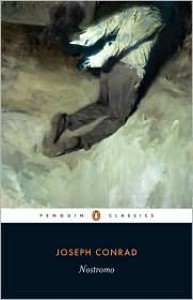
Why did it take me so long to finish Nostromo? First of all, life. I don’t know about you guys and girls, but my past weeks, even months were busy and crazy af. Secondly, for various reasons, 6 other books squeezed themselves in between since I started Nostromo in April, which – in hindsight – was not helping the reading experience, because this is a very complex novel.
Therefore the already confusing political circumstances became even more confusing for me, because after a long break from Nostromo, during which I might have read two or three different books, I often forgot or confused some of the characters and hence was a bit lost plotwise. But hey, that’s what times filled with revolutions and counter-revolutions are all about – chaos and confusion. So in this regard, I guess I got the full experience.
Nostromo is set in Costaguana, a fictitious republic somewhere in South America. The novel moves quite slowly at the beginning, so initially you have a lot of time to get acquainted with the main characters, the setting and some early events along the storyline. The slow pace is a good thing though, because honestly this novel takes some time to get used to, but the more I progressed, the more it grew on me. With the exception of the last few chapters which are slower again, Conrad really picks up the speed in approximately the last third of his novel – stuff is happening left, right and centre, the perspective is shifting within the chapters, time jumps back and forth and as mentioned before, after taking a long break and reading something else in between, I admit that I struggled quite a bit to pick up where I left, but there is only myself to blame for that.
This is a very political and very complex novel (well, it is written by Conrad after all) about revolutions, counter-revolutions, political scheming, speculation, exploitation, colonization, morals, individual monomaniacal ideas, and everything in between. Even if you read Nostromo without taking crazy long breaks, it is easy to loose focus and I somehow have the feeling that even Conrad himself was on the verge of getting lost in the events of his own novel from time to time.
Somehow Nostromo reminded me a lot of For Whom the Bell Tolls, especially regarding the South American way of revolting and not really caring at the same time. Yet the political relativism expressed by Conrad surpasses Hemingway by miles! Conrad challenges the whole notion of linear historical progress by presenting a cyclical repetition of events that ultimately renders every decision and action basically irrelevant. One of my favourite sentences from the novel’s preface, that sums up this point really well, is: „Nostromo’s narrative structure generates a similar chaos by blurring cause and effect.“ I couldn’t have said it any better.
As I mentioned in one of my first Nostromo posts, the character Nostromo appears very scarcely (similar to Quasimodo in The Hunchback of Notre Dame), even though there is a sheer mountain of secondary literature dealing solely with Nostromo, his motives and/or his psychology. Personally, I didn’t much care for him, and neither did Conrad apparently (as expressed in one of his letters): „I don’t defend Nostromo himself. Fact is he does not take my fancy either.“
One more thing editing-wise. The editor added quite a number of notes and annotations to the text, most of which is helpful background info about historical events, literary sources or just a general help for some of the strange sounding expressions for which Conrad used a one-to-one translation of a Gallicism into English. But if I ever meet the editor (which is highly unlikely), I will personally punch her in the face for one of the notes in which she completely spoilers the death of a character without any warning! This particular character just got introduced in the very chapter in which said annotation is placed and it happens to be the one character I immediately fell in love with and really cared about.
But to finally wrap this up: the 3,5 out of 5 stars reflect my personal reading experience (which was a rather rugged one) rather than the actual quality of Nostromo. Because to do such a novel justice, I would have to re-read while being more focused which I will do at some point in the future.
Hologrammatica

As my latest readings probably reflect quite strongly, I am currently on the lookout for contemporary writings on robots/cyborgs/androids and AI due to this being the focus of my work-in-progress-master-thesis in comparative literature.
So, Hologrammatica is a detective story (the nightmare of a cover calls it a “thriller“) about our world at the end of the 21st century (2088 to be exact). By this time the so called Holonet is everywhere, which is best explained as five different levels of three dimensional holographics which are superimposed onto the real world (including advertisements, different textures on buildings and garments, alterations of appearance and so on).
While technologically advanced in this way, mankind has learned from a “little“ AI incident in the past when an AI, which was built to solve our problems with climate change, went a little skiwompous and the whole technological infrastructure had to be shut down for weeks in order to deal with this rogue AI. Since then, it is strictly forbidden to develop any “intelligent“ software and also privacy and personal data are heavily protected. Well, there wouldn’t be a story if it was like that..
In short, it is the story of a detective, hired to find a programmer who disappeared. While I am usually not a big fan of detective stories, I found the story enjoyable. Predictable from time to time, but overall entertaining.
Reading progress update: I've read 157 out of 560 pages.

This time I am giving contemporary writing a shot. So far Hologrammatica is ok, the cover design is still giving me a headache though.
I had to read it again
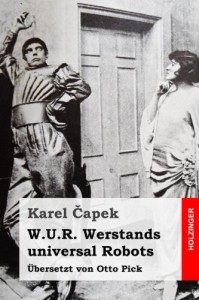
I read Karel Čapek’s wonderful drama last year, I just had to read it once more and I still find it wonderful. Therefore, I still agree with everything I wrote in my review back then.
Machines like you and me?

This novel is all over the place! McEwan is cramming so many different agendas into 300 pages, it is almost ridiculous.
First and foremost, there’s the invention of highly advanced androids that seem to be an almost perfect imitation of humans – they walk and talk like humans, they have a simulated breath, heartbeat and digestion, their "skin“ feels warm to the touch and they claim to have a consciousness as well as feelings. And if this wasn’t enough of material for the plot, there is also British politics (in a version of Britain with an alternative history – a little different, but in the end, same problems as usual), a protagonist in love, death threats of a rapist, court trials, the problems of having an ageing and sick parent, struggles with finding a purpose in life, guilt, Alan Turing (also with an alternative biography), bureaucratic problems with adopting a child, a quite impressive amount of sex, and, believe it or not, stock trading. And did I mention that there’s an android?
Without going in too much detail, Machines like me could have been a lot better if the author concentrated on one or three agendas tops instead of trying to fit everything into one novel.
The Island of Dr. Morel

The Invention of Morel was called many things – the first successful work of Adolfo Bioy Casares, an updated version of HG Wells’ The Island of Dr. Moreau (well, updated from a 1940’s standpoint), a great fable about the longing for immortality, a classic of modern fiction, and so on.
In short and without any spoilers: it is the story (presented in form of a diary) of a (I think nameless) man who was convicted to a life sentence, but who manages to escape and hides on a forlorn island to which no ship ever sails near, because it is said to be cursed with a deadly disease that kills everyone. One day, out of the blue, a group of people suddenly appear on said island (seemingly on a vacation trip), including Faustine, the woman with whom the protagonist quickly falls in love with and who he starts stalking. Consequently, he finds out why those people are behaving in the strange way they do, but I won’t spoiler anything.
I found it very hard to read. Syntax, lexis and in part punctuation (or the lack of punctuation to be exact) take a lot of fun out of it. To be fair, since no hablo español, I read the (not so new any more, but still newest) German translation and maybe the crazy syntax is a problem that stems from Haefs as translator rather than from the original text itself, but the problem is still there. I had to re-read some sentences or even whole paragraphs five to ten times, until I finally grasped their meaning (at least I think I did) and I still wonder why a great portion of this novel, the first 40 pages or so in particular, is verbalised in such a strange and unnecessarily cumbersome way.
Apart from that, the novel is quite exciting. I have read my fair share of let’s call it "adventure novels“ about people who arrive on a deserted island where weird stuff is happening and therefore I think the psychological analysis of the protagonist is done exceptionally well. The protagonist is a little thick-witted and indeed reminded me of Prendick in that matter, but his almost paranoid obsession with the group of people who arrive on "his" island makes sense and has great depth.
But very much like Nabokov’s Invitation to a Beheading I find the concept of The Invention of Morel way more intriguing than the novel itself.
Life and Death
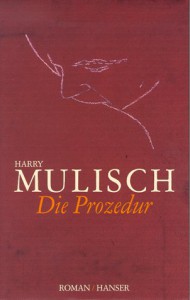
Harry Mulisch‘s novel The Procedure is definitely demanding and I am sure it has scared away more than a handful of readers.
The best adjective to describe this text is probably heavy. Everything in here is heavy, the symbolism, the references and the topic. To be fair, this is to be expected from a book dealing with the dialectics of life and death, yet it was surprisingly touching as well.
Structure-wise the novel consists of three very different individually stand-alone, yet still intertwined parts. The first one I want to call an introduction to the literary topic of artificial creation (Mulisch being Mulisch, he naturally puts the emphasis on the story of Rabbi Löw’s golem, but we get a lot of Pygmalion and even a bit of Frankenstein as well), the second part is written in epistolary form (the protagonist Victor (of course, he is called Victor!) Werker writes to his stillborn daughter Aurora), dealing with Victor’s family history as well as his scientific endeavours and the last part is a classic third person narrative of Victor and his personal struggles in the present.
Mulisch creates some of the best characters I have found in literature recently – three dimensional, not stereotypical and first and foremost: believable! When I read Hustvedt’s What I loved (which I absolutely did not love btw), I remember being almost appalled by the elitist caricatures of characters who read Wittgenstein’s Tractatus just for fun before going to bed – because that’s obviously what academics do in her opinion. Whereas Mulisch’s characters are moving in the same academic (almost Nobel Prize winning) spheres, he is able to portrait them as humans who can talk about other things besides their area of research and do not know the entire oeuvre of Shakespeare and Cervantes by heart.
Anyway. There is a strong emphasis on women being and becoming mothers, a lot of writing about pregnancy and the actual act of giving birth, almost to the point where it feels like Mulisch is telling Freud that he can take his Penisneid and go to hell with it or stick where the sun don’t shine.
As you can see, The Procedure is going all over the place and is trying to be a lot at the same time. Strangely enough, it works though. In the end, the novel is above all emotionally demanding, although, after having finished it, I am somewhat left emotionally unsatisfied.
QualityLand 1.6
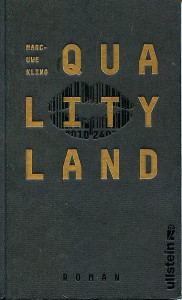
Having finished QualityLand (the dark edition, of course) I am surprised. Positively surprised. It is easy and fun to read, I understand why everyone praises it so highly and why my dad persistently urged me to read it.
Contrary to popular opinion, I would declare QualityLand a satire and not so much a dystopic novel. Marc-Uwe Kling has a very keen sense of language and he incorporates a number of great, innovative ideas with which he transforms our present-day world into the near-future society of QualityLand, where everyone is just a notch above our current level of being technology-crazy. The story is lovely in its simplicity: the Everyman Peter Arbeitsloser (which translates to Peter Jobless, I presume?) wants to return an item he neither ordered, nor wants to have, but which the algorithms in charge (because algorithms have basically taken over) refuse to take back, since they insist that Peter really wishes to have it, even though he himself doesn’t know it. And machines don’t make mistakes, right? Speaking of Peter Arbeitsloser; the idea of giving everyone the name of his/her parents’ job as a surname – *chef’s kiss*.
The world of QualityLand is constructed slowly and carefully, meaning that there is A LOT of exposition. I would even go this far and say that the first half of the book is mainly exposition setting up everything in order for the plot to be able evolve in the second half. But I really enjoyed reading the first half, it is funny, witty and even a bit scary once you start thinking about it. And once the plot starts, boy, does it move quickly. Overall good and smart writing with a lot of enjoyable German humour (when an Austrian says „German humour“ it is usually not a compliment, but in this case most of the jokes were indeed funny).
It is a matter of taste, but I did not enjoy the ending, I think it is a little rushed (especially in comparison to the slow pace in the beginning) and overloaded, because Kling felt the need to tie everything together in the last eleven pages, including the meta-level epilogue, which in my opinion was unnecessary.
My only real point of more or less objective criticism is that some explanatory passages were done really poorly. By that I specifically mean the parts in which most theories and principles that are used / parodied in the book (like Peter‘s Principle, game theory, Turing Test etc.) were explained in monologic straight up narration. You get the fact that Kling did quite a bit of research anyway by reading QualityLand and I hate it, when authors just throw a summary of what they found out about a certain topic directly in your face.
But apart from that, QualityLand is light fiction, that greatly entertains you while dealing with some serious underlying problems of our present-day world at the same time.
Reading progress update: I've read 181 out of 385 pages.

Hi, everybody!
I haven't posted anything in quite some time due to being busy af. I had to meet a couple of deadlines, I was also visiting my familiy for the first time in over two months (thanks to the whole Coronoa mayhem), I had to take my cat to the vet – you know, life happed.
Anyway. I am still reading Nostromo by Conrad and I am still a little sceptical about it, although it is growing on me (more on that in another post), but I had a four-hour train ride yesterday during which it was raining most of the time and I just was in the mood for something less serious. So I started reading Qualityland by Marc-Uwe Kling (additionally, my dad is a fan of it and he has been urging me to read it for the past 1,5 years) and I do not regret it – you are in for a fun review as soon as I am finished with it.
Reading progress update: I've read 105 out of 496 pages.

So I just finished reading the first part, but there is not much I can say. I don't love it, but I also don't hate it so far.
I really hope, that Conrad used the first part as a sort of exposition (lenghty backstories, lots of descriptions of the setting and the characters) and that the book will get its shit together from now on.
Reading progress update: I've read 68 out of 496 pages.

I like it so far. Maybe it's because I have been playing a lot of AC IV lately, but I am really in the mood for this sort of narrative.
Although the novel is called Nostromo, Nostromo as a character has hardly appeared so far which makes me wonder if he is going to have a bigger role in the following chapters or if this is more of a Hunchback of Notre Dame situation.
This is what science without the humanities would look like
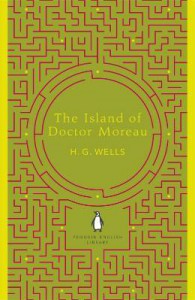
A little heads-up: there’s a long review following.
As a big fan of H. G. Wells, I was planning on reading The Island of Doctor Moreau for quite some time and I am glad that I finally got around to do it.
The beginning of this novel was really great, but then I fount it to get a bit messy. There are a lot (yes, A LOT) of passages in which Prendick is wandering around the island and describes the jungle, the beach or just the landscape in general. I absolutely don’t mind that, but many of those passages were so oddly placed. For example, if you were a castaway on a strange island and being chased (because you were a bit naive and hysterical) until you can hardly stay afoot, would you just sit down and start wondering about your beautiful surroundings? Maybe those action scenes were a bit much for the audience back then and Wells had to calm them down with the description of a nice beach or a clear stream after all the excitement? Whatever the reason, many of those landscape-parts definitely felt odd.
Also, how can Prendick be so naive and stubbornly wrong? To be honest, it is quite clear from the very beginning, that Moreau is trying to turn animals into humans and not the other way round as Prendick beliefs for quite a long time.
I also don’t understand this late 19th century revulsion at „strange“ creatures. Although Prendick goes constantly back and forth between repulsion, fear, pity, and sometimes even sympathy I think, I cannot understand why he is disgusted by the „Beast People“ and not by Dr. Moreau.
The one character I do understand is Montgomery. He and the „Beast People“ are actually the only ones I am considering as being human. Moreau is obviously portrayed as the mad scientist and Prendick (especially in the last third of the novel) is the impersonation of English imperialism, arrogance and presumptuousness. Instead of being thankful to the animals for accepting him as one of their own, instead of cooperating with them and treating them with respect, he tries to rule them. He tries to make himself their new master and enslave them. And why? Because he thinks himself superior (although he clearly is not, because he relies on the help of the „Beast People“ for food and protection).
But what is The Island of Doctor Moreau I wonder? Is it a pamphlet against blind and cruel science? Against the „I do what I must, because I can“ dictum some people adopt as soon as they put on a lab coat? Is it Wells attempt to show that man is not special, but just another animal? Or is there also a hint of the exact same fear of „going native“, of the de-evolution from man back to beast that haunted Joseph Conrad so much?
If I have learned anything from those innumerable hours of watching the classic Dr. Who, it is that one crucial question which everybody should ask themselves whenever any other creature is impacted by ones action: „do I have the right?“ If Moreau would have done so, he might have been a better doctor.
Robots, Robots, Robots
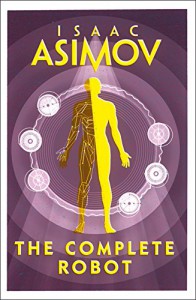
As the name indicates, The complete Robot is compiled out of all of Asimov’s robot stories, which means, that this collection also includes all stories that make up the famous I, Robot collection. There are 31 stories in total, grouped into seven categories (for example non-human robots, immobile robots, metallic robots, humanoid robots and so on), all of them ranging in length and quality.
It would be too much to review each and every one of them individually, so I decided to just give you Sally, Someday, The Tercentenary Incident and Mirror Image as my favourites and True Love and Satisfaction Guaranteed as honourable mentions.
Reading progress update: I've read 92 out of 547 pages.
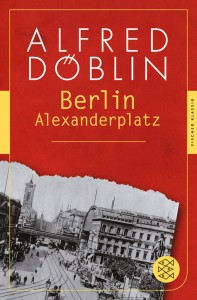
I quit. This is not my cup of tea.
I am not sure, what I was expecting Berlin Alexanderplatz to be like. I guess, I wanted it to be more like something written by Dostoevskij and less like something written by James Joyce.
Maybe I will give it another try someday, but for now, I cannot bring myself to continue.







 4
4
 2
2
